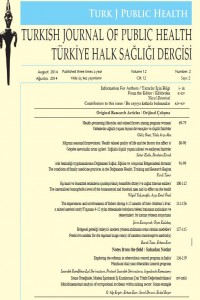Yaşamın 4-12 aylık döneminde babaların bebek bakımına katılımları ve deneyimleri: bir karma yöntem araştırması
Abstract
Amaç: Araştırma, 4-12 aylık sağlıklı bebeği olan babaların bebek bakımına katılımları ve deneyimlerini belirlemek amacıyla yapılmıştır.
Yöntem: Bu çalışmada babaların bebek bakımına katılımları ve deneyimlerini belirlemek üzere karma araştırma yöntemi kullanılmıştır. Sosyoekonomik statüleri farklı 2 sağlık ocağı merkezinden 260 katılımcı, %95 güven aralığı ve %5 örnekleme hatasıyla belirlenmiştir. Niceliksel veriler araştırmacılar tarafından geliştirilen Likert tipi bir soru formu olan “Babaların Bebek Bakımına Katılım Soru Formu”yla, yüz yüze görüşülerek toplanmıştır. Niteliksel verilerin elde edilmesinde amaca yönelik olarak seçilen 32 babayla derinlemesine görüşme yöntemi kullanılmıştır. Araştırmanın niceliksel verileri Varyans Analizi (ANOVA), Bağımsız İki Örnek T Testi, İki Ortalama Arasındaki Farkın Önemlilik Testi ve Stepwise Çoklu Regresyon Analizi Testi ile analiz edilirken, niteliksel verilerin analizinde tematik analiz yöntemi kullanılmıştır.
Bulgular: 5’li Likert soru formu sonuçlarına göre babaların bebek bakımına katılım puan ortalamaları fiziksel bakıma en az ( X = 2.5), ilgi ve oyun aktivitelerine en yüksek ( X =3.9) olarak bulunmuştur. Babaların bebek bakımına katılım genel puan ortalaması ise X =3.0’dır. Babaların bebek bakımına katılımları bebeğe ayrılan zaman (p<0.001), kendilerinin ve eşlerinin eğitim durumu (p<0.001) ve sahip olunan çocuk sayısıyla ilişkili olup (p<0.01), bu değişkenler bebek bakımına katılımlarının %37’sini açıklamaktadır. Niteliksel veri sonuçlarından beş temaya ulaşılmıştır: 1) Babalık: Tanımlaması zor bir kavram, 2) Kibir mi? Yoksa yenilik arayışı mı? 3) Koşullu babalık, 4) İşim her şeyden önce gelir ve 5) Bebek bakımı: tepkilerin de ötesinde. Sonuç: Bu çalışma sağlık bakımı sunanların bilgi veritabanına, babaların çocuk bakımına katılımlarının daha iyi açıklanmasını sağlayarak katkıda bulunmuştur. Ancak farklı sosyo-kültürel ve ekonomik gruplar ile yürütülecek ileri araştırmalara gereksinim vardır.
Keywords
The experiences and involvements of fathers during 4-12 months of their children’s lives: a mixed method study
Abstract
Objective: The purpose of this research is to determine the experiences and involvements of Turkish fathers in the care of their 4-12 month old healthy infants.
Methods: Fathers’ experiences and involvements in the care of the infants were examined by using a mixed method research design. 260 participants were selected from two health care centers of different socioeconomic status, and reported with a 95% confidence interval and 5% sampling error. The quantitative data were collected through a self developed Likert-type questionnaire named “Fathers’ Involvement in Infant Care Questionnaire” by researchers using face to face interviews. Qualitative data were collected through in depth interviews from 32 purposefully selected fathers. Analyses of quantitative results used the Analysis of Variance (ANOVA), the Independent Samples T Test, the Least Significant Difference and Stepwise Backward Multiple Regression Analysis tests while qualitative data analyzed by the thematic analysis method. Results: The five-point Likert questionnaire results showed that average score of paternal involvement in infant care was 3.0. Fathers who declared the least interest in the physical care of their infants ( X =2.5), expressed the most interest in game activities ( X =3.9).The fathers involvement in child care significantly correlated with the time they devoted to child care (p < .001), the fathers’ level of education (p < .001), the wives’ level of education (p < .01), the number of children (p < .01), and the combination of these factors explained the variability of the fathers’ involvement in child care by 37%. The qualitative results revealed five themes. 1) Fatherhood is a hard concept to portray, 2) Is this an arrogance or to negotiate a new? 3) Conditional fatherhood, 4) My job comes first and 5) Caring for the baby: Beyond the reactions. Conclusions: This study contributes to health care providers’ knowledge database by providing a better understanding and explanation of fathers’ involvement with childcare. However there is a need for further investigations conducted with different socio-cultural and economic groups.
Keywords
Details
| Primary Language | English |
|---|---|
| Subjects | Health Care Administration |
| Journal Section | Original Research |
| Authors | |
| Publication Date | August 22, 2014 |
| Submission Date | December 12, 2015 |
| Published in Issue | Year 2014 Volume: 12 Issue: 2 |
Cite
Cited By
BABALARIN ÇOCUKLARINA YÖNELİK ALGISI: İLK BABALIK DENEYİMLERİ
Sosyal Politika Çalışmaları Dergisi
https://doi.org/10.21560/spcd.vi.1218406
Paternity leave: A systematic review of studies in education and psychology from 1990-2019
International Journal of Social Sciences and Education Research
https://doi.org/10.24289/ijsser.815369
Papel paterno nas relações familiares: revisão integrativa
Acta Paulista de Enfermagem
https://doi.org/10.37689/acta-ape/2022AO0306345
0-2 Yaş Bebeği Olan Babaların Bebekle Olan İlişkisi
Ordu Üniversitesi Hemşirelik Çalışmaları Dergisi
Melike PÜNDÜK YILMAZ
https://doi.org/10.38108/ouhcd.894434
TURKISH JOURNAL OF PUBLIC HEALTH - TURK J PUBLIC HEALTH. online-ISSN: 1304-1096
Copyright holder Turkish Journal of Public Health. This work is licensed under a Creative Commons Attribution-NonCommercial 4.0 International License. 


